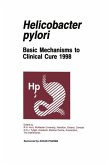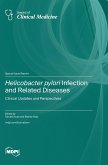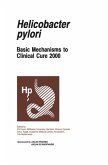Helicobacter pylori is an ancient microorganism that co-evolved with humans for many years and typically colonizes the human stomach and is being recognized as the most common infectious pathogen of the gastroduodenal tract. Some years after bacterium isolation, epidemiological studies have revealed a correlation between its infection and some diseases localized outside the stomach, such as hematological, hepatobiliary, pancreatic, cardiovascular, neurological, dermatological and respiratory diseases. Different mechanisms of action have been proposed, ranging from the induction of a low-grade inflammatory state to the occurrence of molecular mimicry mechanisms. This book is an overview of contributors surrounding the association of H. pylori infection with extragastric diseases, based on evidence, bacterial-host interactions and mechanisms implicated in the pathogenesis of some of these disorders.
Hinweis: Dieser Artikel kann nur an eine deutsche Lieferadresse ausgeliefert werden.
Hinweis: Dieser Artikel kann nur an eine deutsche Lieferadresse ausgeliefert werden.








